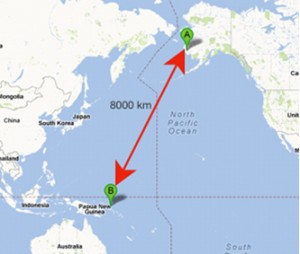By Alyssa Johl and John Crump*
 This week, community leaders from two small villages in very different parts of the world will meet on Bougainville Island in Papua New Guinea (PNG) to discuss a common problem: their need to relocate as a result of climate change. The communities of Newtok, Alaska, and the Carteret Islands, Papua New Guinea, are among the first in the world to choose relocation as the best means of adapting to the effects of a changing climate and ensuring their cultural survival.
This week, community leaders from two small villages in very different parts of the world will meet on Bougainville Island in Papua New Guinea (PNG) to discuss a common problem: their need to relocate as a result of climate change. The communities of Newtok, Alaska, and the Carteret Islands, Papua New Guinea, are among the first in the world to choose relocation as the best means of adapting to the effects of a changing climate and ensuring their cultural survival.
Both communities are from highly vulnerable parts of the world. Climate change is currently being felt directly by peoples and communities in similarly situated regions, as storms become more violent and unpredictable, sea levels rise, and coastal erosion literally pushes communities into the sea. As we gather on a remote island in the Pacific, Arctic sea ice will continue to melt – in fact, sea ice is now at an all-time low, according to data produced by the National Snow and Ice Data Center. The people in the Carterets, like those in other Small Island Developing States (SIDS) understand there is a direct connection between the sea ice decline and other changes in the Arctic and the adverse impacts they are experiencing. This relationship – which might otherwise be seen as remote and unconnected – is the foundation of Many Strong Voices, a programme that brings together people and organizations in the Arctic and SIDS to take action on climate change.
Many Strong Voices and the Center for International Environmental Law, in collaboration with our partner the Alaska Immigration Justice Project, are working to connect and build the capacity of other communities facing similar relocation challenges. This week’s dialogue between community leaders from Newtok and the Carterets is only the beginning of what will evolve into a larger initiative. In a project called Climate Change and Community Based Relocation: Supporting Adaptation, Protecting Human Rights, communities and partners will work to: document the experiences and lessons learned from these and other relocation processes; identify the needs and challenges communities face in implementing culturally appropriate adaptation strategies, including relocation; and develop guidance that could be used by other communities that have identified the need to relocate.
Despite the devastating effects climate change is already having on coastal and island communities around the world, the stories of Newtok and the Carteret Islands are not about climate “victims” or “refugees” (a wholly inappropriate term for both legal and cultural reasons), but rather about problem solvers. They are about leadership in the face of extreme challenges and threats to one’s cultural heritage and survival. They are about overcoming those challenges using local and traditional knowledge and decision-making processes – and a whole lot of creativity. And they are about the strength and resilience of two communities that are taking the necessary actions to relocate to ensure the cultural resilience and long-term sustainability of their respective communities. Again, this workshop is only the beginning. We still have much to learn.
* Alyssa Johl is a Staff Attorney in the Climate Change Program at the Center for International Environmental Law. John Crump is a Senior Advisor on Climate Change at UNEP/GRID-Arendal.
Originally posted on September 27, 2012.
